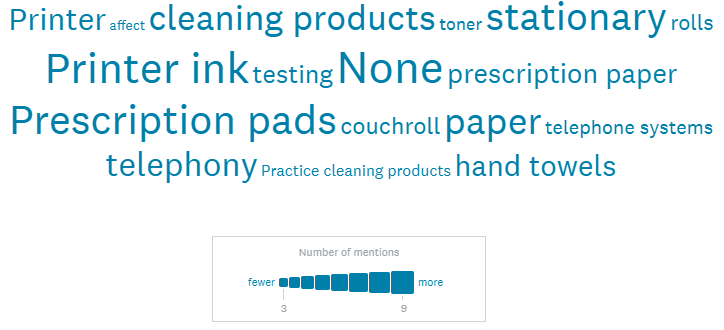EU Exit Planning: Non-Clinical Goods and Services
![]() Thank you for responding to our recent survey on practice needs in the event of a no-deal Brexit. We rely on your input.
Thank you for responding to our recent survey on practice needs in the event of a no-deal Brexit. We rely on your input.
Following a discussion at our Annual General Meeting on Thursday 24 January, we asked you about the impact of a no-deal EU exit on your practice-critical Non-Clinical Goods and Services (NCGS). Medical devices, clinical consumables and medicines are being considered separately.
We asked you to consider:
- The dependency of those goods/ services on that front-line service;
- The criticality of that front-line service and its clinical importance; and
- Outsourced services such as equipment maintenance.
We had a really good response and have been able to advise officials about supply concerns across London in good time. Whilst there were a number of respondents who are unconcerned about the impact of no-deal Brexit, those who do harbour concerns highlighted a number of non clinical products and services which they fear might be affected. These include:
- Stationary;
- Printer ink;
- Prescription pads;
- Couch roll;
- Paper;
- Telephony;
- Cleaning products;
- Prescription paper;
- Printer;
- Hand towels;
- Testing;
- Telephone systems;
- Practice cleaning products; and
- Toner.
We will continue to work with officials to identify and anticipate the impact of Brexit on London general practice, be it no-deal or otherwise. Other possible EU exit risks include:
- Goods or services that have supply chain touch points in the EU;
- Personal data held in EU member countries;
- Supply routes into the UK via Dover/ Calais; and
- Dependencies on EU regulations.
If you have any comments or questions about this work, please contact us.
This word cloud gives some indication of respondents' concerns.

MWord 40 (20 Jun 2019)
Londonwide LMCs' June 2019 Newsletter (19 Jun 2019)
...Tips of the month June 2019 (19 Jun 2019)
We provide weekly tips based on common queries which come through to us from London GPs and practice teams. These are shared via social media and collated for...PCN Model Schedules update (19 Jun 2019)
We will shortly be issuing an updated version of our PCN Model Schedules to reflect new information which has become available, and respond to queries from practices. The updates include...Babylon GP at Hand update June 2019 (19 Jun 2019)
At the end of May we became aware that Babylon GP at Hand had submitted an application to become a Primary Care Network (PCNs) in Hammersmith and Fulham, with the...Top tips for travel health (18 Jun 2019)
This month Jane Chiodini shares some advice on managing travel health. Jane is a specialist nurse in travel medicine and last October became the first nurse to become Dean...New GP State of Emergency resources (18 Jun 2019)
Thank you to everyone who attended the popular GP State of Emergency (GPSOE) workshop at our annual conference in March, run by Dr Elliott Singer, the Medical Director leading on GPSOE...Migration Advisory Committee calls for GPs to be added to the Shortage Occupation List (14 Jun 2019)
At the end of May the Migration Advisory Committee (MAC) recommended that the Government add all medical practitioner roles to the Shortage Occupation List (SOL). Being on the SOL means...June 2019 workforce survey – thank you for responding (14 Jun 2019)
Our latest workforce survey officially closed on Tuesday 18 June, but we are allowing those who have opened the email to complete the survey, so please do so if you have the...Mword - Issue 39 (13 Jun 2019)
Guidance
We provide expert guidance for practices in our guidance section, as well as an archive of other materials you may find useful.
GP Support
Contact our GP Support team if you need help or advice.
The team provide professional and pastoral support to GPs and practice teams on a broad range of issues.

